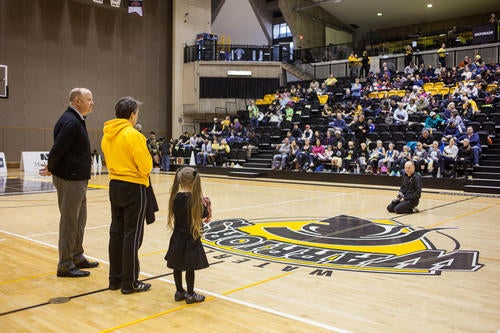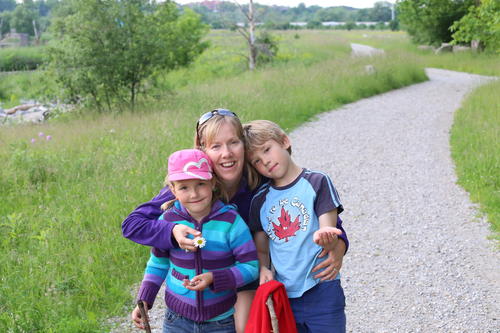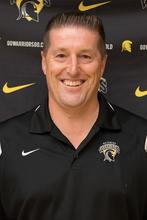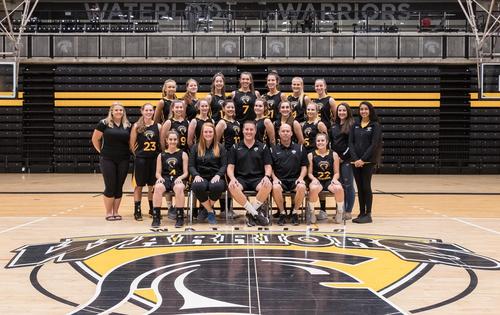St. Paul’s Booster Club and awards program support female student-athletes
On November 7, professional athlete, coach, and Right to Play ambassador Zahra Mahmoodi gave the Stanley Knowles Humanitarian Service Lecture at St. Paul’s. She spoke about growing up as a refugee, watching longingly as the boys played soccer, a game forbidden to girls. About secretly teaching herself—and then other girls—to play. And about her grief when threats to her life forced her to flee the country she so proudly represented on the field.
In the audience were members of the University of Waterloo’s women’s basketball team, there to show support for a fellow athlete. Thankfully, they will never experience the hardships Zahra faced as she fought for her right to play. But like many female athletes, they too face challenges.
Across Canada, for instance, women’s athletic programs at every level receive far less funding than men’s do. Only a handful of head coaches or athletic directors at our post-secondary institutions are women. And, according to a recent study, of the approximately 35,000 hours of sports programming that aired in 2014, only 4% featured women’s sports.
That lack of funding and exposure means that, every year, fewer girls participate in athletics. Fewer female role models emerge to encourage their sisters. And countless women and girls are missing out on all the physical and mental benefits that sport provides.

Principal Rick Myers (centre) with Athletics Director Roly Webster and daughter Elizabeth speaking about the launch of the Booster Club.
St. Paul’s hopes to help level the playing field, at least for one group of female athletes. Inspired by Waterloo’s HeForShe campaign to promote gender equity, the College has launched a Booster Club and awards program that will benefit the basketball team.
“This is one way we can celebrate women’s achievements,” says Principal Rick Myers. “We felt a partnership with the team was a perfect fit. It’s an up-and-coming program that could benefit from new fans at the games and some financial support.”
At the same time, the team creates a focal point which St. Paul’s alumni, students, staff, faculty and past residents can rally around. And it’s an opportunity for the College to share its tradition of welcome with the players; seven of the team’s new recruits have chosen to live at St. Paul’s this year.
Opening doors, creating opportunities
Julia Salvini (’98) is an alumna and member of St. Paul’s Board of Governors. As one of the organizers of the Stanley Knowles Lecture, Julia helped bring Zahra to speak after learning her story.
“I was excited to hear more about how sport opened doors and created opportunities for her,” she says.
Julia’s daughter is a hockey player and she’s seen first-hand the valuable lessons that athletics teaches, as players learn to rely on each other, to work together, and to win and lose as a team.

Julia Salvini with her kids, both of whom play organized sports.
And as a hockey mom, she also knows how important it is to is have someone on your bench. That’s why she’s pleased that, as a result of the Booster Club, a growing number of St. Paul’s fans make regular appearances at basketball games to cheer “their” team on.
“A lot of these varsity athletes had supporters in their home communities—friends and family —to watch their games. But then they come to university, and for some of them, their family is very far away. It’s nice to know there are familiar faces in the crowd,” Julia says.
And that support is just as important off the court, when the focus switches from athletics to academics.
“I can speak from my own experience, that St. Paul’s is a place where you feel like you’re supported by dons and staff and, especially, fellow students, “Julia says. “Because when you’re a second-year calculus student and you need an answer to a problem, you need to find another second-year calculus student. At St. Paul’s, there’s always someone who can help you out.”
Broadening perspectives
 When Craig Nickel joined Waterloo as the team’s head coach in 2016, he was determined to increase funding for his players.
When Craig Nickel joined Waterloo as the team’s head coach in 2016, he was determined to increase funding for his players.
Canadian universities, unlike those in the US, don’t offer athletics scholarships. Instead they offer Athletic Financial Awards (AFAs), which are capped at $4,500 per student per year.
St. Paul’s new Women’s Basketball Excellence Awards will increase the number of AFAs Waterloo can offer. And for varsity athletes competing in sports like basketball that run the entire academic year, this support is crucial.
“We all know how expensive post-secondary education is,” Craig says. “But between academics and the demands of a two-term season, it’s impossible for players to hold a part-time job. These awards will make a huge difference to our athletes.”
As the team settles in to a new season, and their new home, Craig encourages his players to take advantage of not just St. Paul’s social opportunities, but its learning opportunities— like the Stanley Knowles lecture—as well.
“Part of our mission as a university is to broaden our students’ perspectives. They get a world-class education and an amazing athletic experience at Waterloo, but we also want them to become engaged citizens of the world. And that’s such a big part of St. Paul’s mission,” he says.
“I would like to express deep gratitude to Dr. Rick and entire St. Paul’s community for this partnership. We are so pleased to have the players staying with you. This has been a blessing for us.”

Basketball photos credit to Jon Halpenny and Waterloo Warriors










